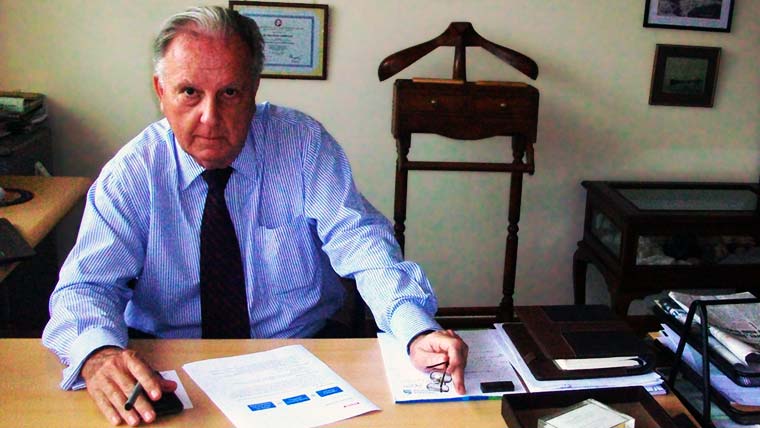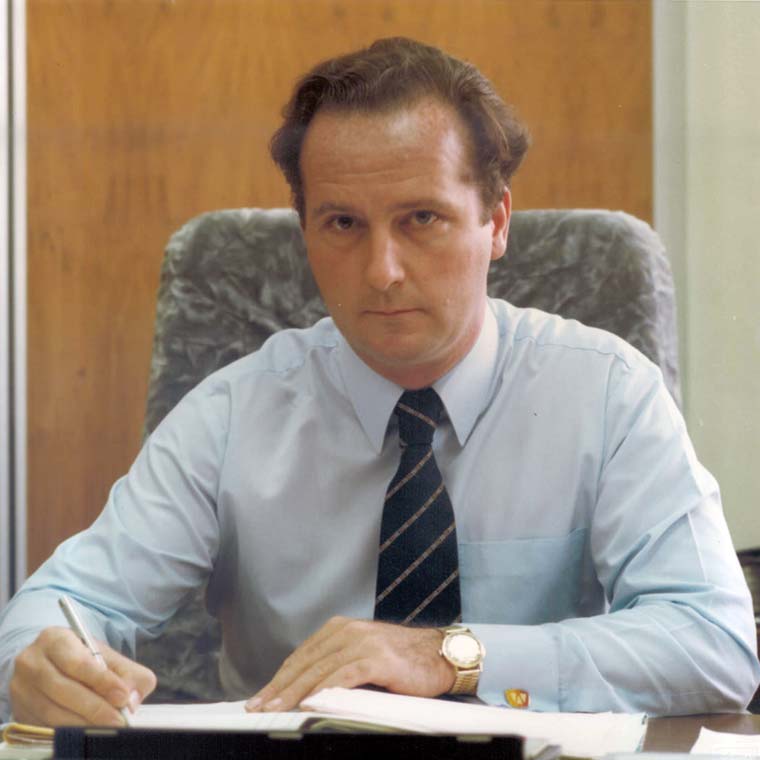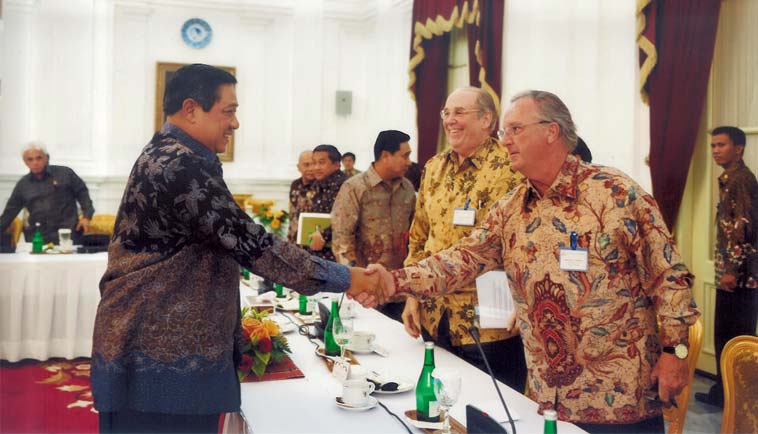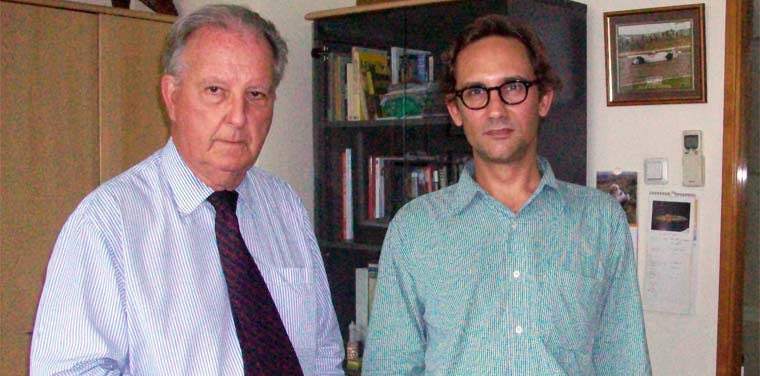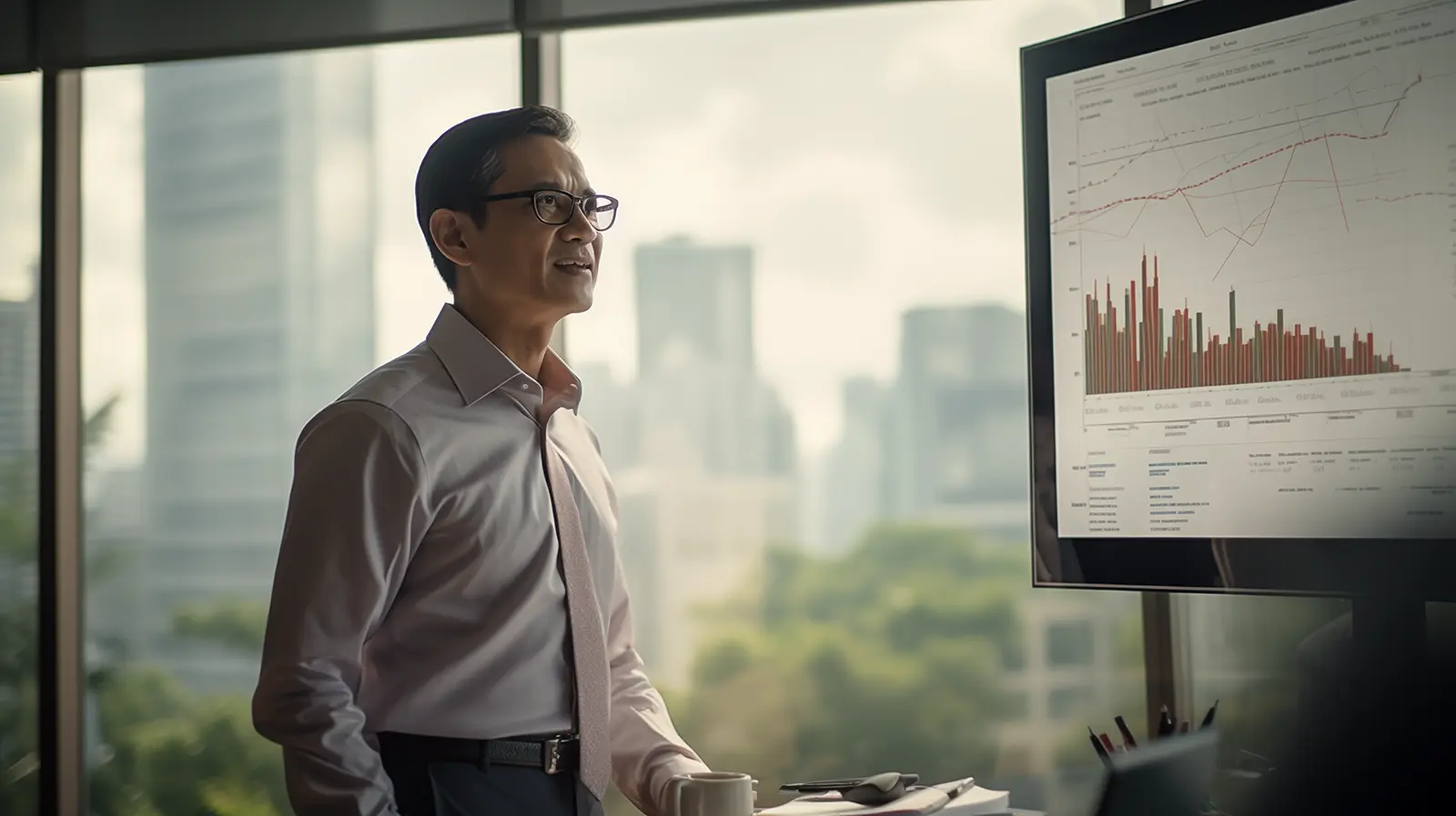Table of contents
Malcolm Llewellyn is Indonesian cement business veteran, having lived here for over 30 years. Nowadays he is managing his own cement consulting firm Nusa Prima Persada. When most other expats left in 1998, he stayed.
When did you visit Indonesia for the first time?
November 1978. My company, Blue Circle Cement, which was the biggest cement company in the world decided to look at building a plant here in partnership with an Indonesian who had already invited us. So I came out to do the feasibility study. We then built the plant and operated it for 6-8 years.
Malcolm Llewellyn in 1981 after arriving to Indonesia
How did Indonesia look at that time?
Pretty barren. My UK Financial Director came to Aceh with me, which was less developed than anywhere else, and he said,” I don’t see any market”. Production of cement in those years was less than 2 million tons a year – it’s now 60 million.
So you never actually left after 1978?
When Blue Circle decided to invest, we had to set up the company, going around the world raising money from IFC, CDC, DEG Jeddah, etc and procuring the plant which finally came from Japan. I actually moved to Aceh in 1979 and built the factory, ran it and left in 1984.
Where did you get the idea to start your own business?
In 1998 when the Indonesian Krismon happened I decided to stay. Basically to ride out the storm and wait until everything was all right. In fact, it took 10 years for the market to get back to the 1998 level, during which time I started my own business. I had to, otherwise I would have had to leave.
Starting his own cement consultancy
What were the biggest challenges in starting your company and how did you overcome them?
I hadn’t got any money. I had no job or money and it’s difficult to do anything in Indonesia from that position because you’re not allowed to be in Indonesia unless you’ve got a job. To invent a job is difficult. You have to start a company and do all the paperwork before you can actually produce a work permit for yourself to be legal.
Indonesia makes it very difficult for anybody to start unless you have a partner. I would say having a partner is the most important thing. I had one, who invited me to his office and managed to get me a work permit. We then formed the company.
Then the biggest problem was that everybody was bankrupt, literally. Nobody was going to lend you money and interest rates were 60 per cent. There were a lot of businesses for sale but I didn’t have the capital to buy. And nobody overseas, such as Europe, was going to lend anyone working in Indonesia any money.
(Emerhub’s Note: we offer company registration and representative office service. Check out our company registration page.)
What are you working on right now?
I’m doing cement project consulting. Finding people who want to build a cement project or a part of the project is cement. We are telling them how to do it – recommending suitable plants, suitable places, doing geology examination. We do all the studies for them and manage the project as well if they wish.
How is business now?
I believe we are not doing our PR and marketing very well. There are people out there who want to do projects and need help. But they are not necessarily coming to us as we don’t have a track record yet.
Because I’ve always worked for big international cement companies, I haven’t had my name up as a consultant. My partner is doing project management but it has never had anything to do with cement. Thus it is hard to bring in new clients – we do have one big project going on at the moment, so we are doing quite well.
How do clients usually find you?
One or two people have found us on the internet. Occasionally companies ring me and ask if we can build a plant, advise on where to build it, give rough costings, do a geology study, etc. That’s where we start from.
Clients either find us from our website or meet me at a networking meeting. Slightly the other way around – I met two men who had come to Indonesia looking for jobs. I told them that they had to come to BritCham events. One of them came with one-way ticket and in two hours,we managed to get him a job offer. Because I knew everybody at the event, I knew what he wanted and what some others might have needed and just put them together. When you go to networking events, you’ve got a good chance of meeting interesting people.
Most people wanting to build a cement factory in Indonesia would be local businessmen. They are the ones who have the money and want to invest in cement. Then they would need to get hold of me – how I get hold of them, I’m not sure. Cement conferences are one option and I’ve always gone to them over the last 20-30 years.
Do you also go to conferences overseas?
I don’t go too far: for example, there is a conference coming in Jakarta in June and everybody who is doing projects in our industry will be there. I know that because they were there in 1996-1998 but not since. Hopefully they are back now and looking for people like me.
I hope they won’t only be looking at machinery and expecting to do it themselves! If they don’t use consultants, they will be losing a lot of money – which is what usually happens. If you don’t have experience in this country and try to do everything yourself, you will be throwing away a lot of money.
Master networker: Malcolm Llewellyn meeting president Susilo Bambang Yudhoyono
Business networking in Jakarta
Which business networks are you personally part of here in Jakarta?
The British Chamber of Commerce (BrithCham), of course, of which I was Chairman for 5 years. I am also a member of the US, Australian, French, German and European chambers. I don’t go any more to all their events, as that would be too many. Mainly I go to the British and Australian ones.
Are the Chambers helping your business?
When I was chairman of BritCham, I attended all their meetings, about 40-50 per year. It was tough work but we’re helping people. Everyone knows you and is inclined to ask for contacts.
The other Chambers are sometimes similar, sometimes different, but they are all focused on bringing companies into Indonesia. Not much the other way, as there are not that many opportunities in the UK and other European countries.
Opportunities in processing raw materials
Which industries or sectors do you see a lot of potential for foreign investors to get involved in nowadays?
I think you have to listen to the government and the government says we want manufacturing, we want processing. Indonesia has huge reserves of raw materials, all kinds of them. I read that the output of raw materials is going down, mainly because of the ridiculous mining laws.
At the same time, I think it is right that the government is restricting the amount of raw materials leaving the county. They should build a copper smelter in Indonesia instead of sending raw materials out to Australia, China or Japan.
What the government wants is to move up on stage and process metals. You take a piece of copper out of the land, which you then turn into copper wire and then perhaps turn it into electric cable. To a large extent, this is not being done in Indonesia and the government is saying that Indonesia is losing all the profit from this because we sell it for nothing and all the other countries make a fortune selling it back to us for a high price.
That is really where the opportunities are for foreign companies but you don’t come to Indonesia as a private entrepreneur and build a private steel works. You’ve got to be a big steel company, like the Indians who are the biggest players in this industry. Most plants in this country are very outdated: we need new plants.
Any advice on location? Perhaps an area that is off the radar of most foreign companies but should be there?
Because of the very poor infrastructure, especially the roads in this country, you cannot really move 30-40 ton trucks around easily. So water transport becomes crucial, addressing the smaller markets, and you therefore need to build terminals along the coast.
Right now, we are building three terminals in Papua. We are shipping cement there and then, from there, we go inland. In Papua a bag of cement costs $100 as opposed to $10 here in Jakarta because you can’t get it to the end user.
Two generations: Malcolm and his son Alan are now working together in Nusa Prima Persada
Indonesians attitude towards foreigners
Is Indonesia welcoming to foreign entrepreneurs?
Not very, no.
Why is that?
Everybody in Indonesia makes money out of the projects, without doing any work, even those who have nothing to do with them. It should be that you invest money, do your work, make your money and pay taxes on it. Indonesians don’t see it this way – they will close down your business because they want to keep all that money for themselves.
There are places in Indonesia where you need to pay money to everybody in the village, even though they are not involved in the project at all. Otherwise, for instance, the mining companies cannot mine. The government allows this to happen because they say they are looking after the people.
What other things foreign entrepreneurs should look out for when investing in Indonesia?
You’ve got to make sure all your permits are valid. If you buy land, you need to make sure the land documents are really valid and they can be proved, going way back.
All the documentation is difficult to get. Mostly because of corruption – you need to pay people for doing their job. It’s very difficult for foreigners to get anything done.
(Emerhub’s Note: business visa is the fastest and easiest type of visa for foreigners to stay or frequently visit Indonesia. Check out our business visa page.)
How are you making sure your permits are in order?
The normal thing to do is to have agents arrange the permits for you. That is one way around the law.
The company that I was working for over the past 10 years has just left Indonesia altogether because we could not secure all the necessary documents. Some people say that it can be done, but I’m not sure as i’s very difficult.
What are the things foreigners get usually wrong about Indonesia?
Culture is always a problem. A lot of people don’t realise how big Indonesia is – that it’s not just a lot of small islands. It’s 500 miles wider than USA and the 5th biggest country in the world. But it’s not a culture. There are 70 different nationalities in Indonesia, most of them having different cultures.
Many people understand Bali but when you look at Aceh or Kalimantan, it’s quite different from Java – East Java, West Java, Banten – you can go on forever. It’s not possible for a foreigner to pick it up in 10 minutes. The way people sit, the way they talk or look – it’s not sometimes important for us Europeans but it’s important for Indonesians.
Certain people don’t care about it, they say that I am me and you need to put up with me. It doesn’t work. If you want to do well here, you need to study things like that.
Many foreigners are posted here for just 2 years and that is not enough time to learn about the culture. They shout and yell at people in the office and then go home, just to be replaced by some other foreigner on a 2-year contract. That’s something we get very wrong. Of course, it’s the other way around as well – we are not very welcomed by Indonesians either.
Anything particular the British get wrong here?
I’d like to think we are better than average. Our advantage is that we’ve been doing it longer than most other countries. The Dutch were here before us but they were not that brilliant (laughs).
Certainly the language is the problem. I am very bad at learning languages. After 30 years, I still cannot talk with anyone except for drivers and people like that. If I could do it again, I would really put an effort into learning the language. That’s my advice to anybody who asks how to get a job or get started here: take the time to learn the language. It’s very important. Brits are as bad as anyone regarding that.
Most people who’ve stayed here for decades are quite critical about Indonesia. Yet, they still stay here and do business. What do you think this ‘thing’ is that keeps them here?
Where to start … nice people, climate, people, great hotels, golf. Fantastic countryside.
On the other hand, you’ve got filthy smog, too much noise from the mosques, lousy traffic, awful red tape and corruption, bureaucracy and no law. You can’t be sure of anything. Those are the bad things.
But it’s a lovely place to live. People ask whether I like it here and I respond that I’ve been here, on and off, since 30 years ago. If I didn’t like it, I would have moved to some other country years ago.
Any other tips to foreigners before they come to Indonesia to do business here?
Of course there are standard things – you must research the market, the culture and the language. Get advice from people who’ve done it before, whether they are here or back home.
We gather every year in UK, about 1000 people, to discuss Asia. And then we break up into different Asian country groups. In the last few years I’ve been asked to help out with Indonesia and, during that time, usually four-five people gathered to discuss Indonesia and 100 to talk about Singapore.
And I wonder why they want to talk about Singapore? What business will you get in Singapore? There are millions of brilliant Chinese capable of doing business there, they don’t need us. This country does need us but nobody knows where Indonesia is! Now it’s turning around and the numbers for Indonesia are improving. We are attending conferences in the UK and briefing people about Indonesia.
Of course, it also helps to read a book or two. If you read books about Indonesian culture, it might slow you down before making your own assumptions.

